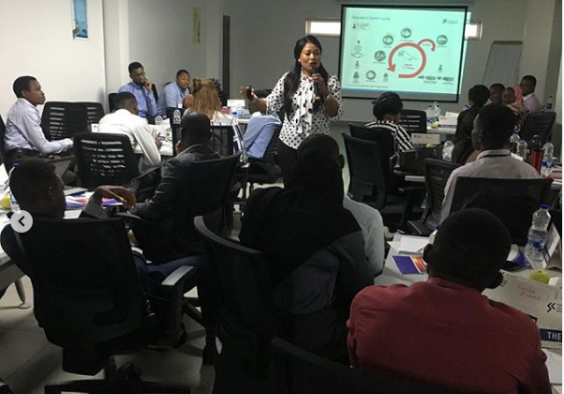Physical/Virtual Sessions organized by The Agile Advisor Africa

Agile is a methodology based on iterative development and process, where requirements and solutions evolve through collaboration between self-organizing cross-functional teams. Agile methods or Agile processes generally promote a disciplined project management process that encourages frequent inspection and adaptation, a leadership philosophy that encourages teamwork, self-organization and accountability, a set of engineering best practices intended to allow for rapid delivery of high-quality software, and a business approach that aligns development with customer needs and company goals.
Scrum is a subset of Agile. It is a lightweight process framework for agile development, and the most widely-used one because of its benefits.
A “process framework” is a particular set of practices that must be followed in order for a process to be consistent with the framework. “Lightweight” means that the overhead of the process is kept as small as possible, to maximize the amount of productive time available for getting useful work done. Scrum significantly increases productivity and reduces time to benefits relative to classic “waterfall” processes. Scrum processes enable organizations to adjust smoothly to rapidly-changing requirements, and produce a product that meets evolving business goals. An agile Scrum process benefits the organization by helping it to:
The potential benefits of full-scale Agile are enormous, although rarely fully realized. Many of the companies that adopt Agile are simply not prepared to make the far-reaching changes necessary to obtain the full benefit. Executive sponsor reluctance is understandable, since some of the most talked about Agile benefits, such as employee well-being and business adaptability, are also notoriously difficult to measure. However, there are many Agile benefits that can be and are being measured in traditional business terms.
Our purpose here is to make the Agile sponsor’s job easier by clearly demonstrating how specific Agile features link to tangible performance improvements. Here are six business benefits that are available to any company that adopts Agile that can be measured using traditional financial and production metrics.
There is no right or wrong person to attend Certified Scrum Master workshop. In fact, the most successful agile adoptions have included training for everyone, right down to Finance and Sales staff. Scrum training is especially appropriate for anyone in the corporate structure dealing with rapidly changing demands. In a traditional organization, these roles might include:
As your company or department plans a move to Scrum, expectations are likely high for positive results. Whether you’re hoping to increase productivity, boost employee morale, or reap financial rewards, you probably have specific goals you hope Scrum will help your company achieve, most of which won’t be visible until Scrum is fully implemented.
What most people don’t know, however, is that there are significant benefits that become apparent even very early on during the transition period, as everyone learns the principles and processes of Agile management. As team members and managers experience working together within this very different system, upsides begin to emerge even during the intense and sometimes stressful process of reconfiguration.
As employees take their newfound freedom and run with it, the resulting need for collaboration naturally leads to adaptation and, in turn, to inspiration, resulting in creative breakthroughs
To provide an understanding of the philosophy and principles in the Scrum framework. To Provide a practical working knowledge of Scrum including roles, meetings, and artifacts . To prepare participants to be comfortable with implementing Scrum in their organizations, as well as utilizing Scrum to manage common issues and roadblocks. To prepare participants to take CSM exam upon completion of the course.
We promise a highly engaging course that ensures higher retention of concepts and theories. Participants are encouraged to work through the concepts rather than just listen to the concepts. This provides a better internalization of course content Role-plays are conducted and practical implementation issues are discussed for all parts of the Scrum flow. A central case study is integrated into the course to enable participants to simulate a product development project using Scrum framework.
Abiodun Osoba has 20 years experience in teleommunications, banking, retail, wholesale, tehnology and software industries. She is the CEO of The Agile Advisor and has trained over 200 staff in Agile fundamentals, Scrum & Kanban and successfully led digital programmes in 3 countries. Starting as a technical contributor, then moved on to the roles of a Business Analyst, Project/Program Manager and now as an Enterprise Agile Coach/Executive Coach/Organization Coach and a Leadership Team Coach for several client Organizations.
Abiodun is dedicated to innovation and operational excellence and facilitates the continuous improvement culture so important to The Agile Advisor.
Abiodun has written over 50 articles on Agile Advice. She is an Agile Facilitator/Trainer. CSM, CSPO, SA, CAL, Certified Agile Coach, Agile Advisor Canada & Nigeria and has over 12 years of experience working in Agile environments. Provided Executive Agile coaching in 3 countries.
Abiodun is a graduate of the University of Abuja, Nigeria, Rotman School of Management – University of Toronto, MIT Sloan School of Management, Harvard Business School. She is actively involved in the Agile community and is an organizer of several meet ups in Canada and Nigeria.



Your Trusted Partner in Business and Digital Transformation.
Executive Office
2nd Floor, Church House,
29 Marina Street,
Lagos, Nigeria.
Executive Management Office
1 Yonge Street Toronto, Ontario Canada M5E 1W7.